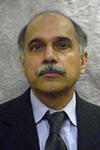Ramamurti Shankar
Quantum field theory
Ramamurti Shankar, recently appointed as the J.W. Gibbs Professor of Physics, focuses his research on theoretical condensed matter physics and quantum field theory.
Early in his career, Shankar studied elementary particles, the smallest particles from which everything else is made, and their interaction with each other. When he joined the Yale faculty, his focus shifted to statistical mechanics, a field founded by J.W. Gibbs, the Yale scientist who made major theoretical contributions to physics, chemistry, and mathematics. Shankar’s research led to several significant solutions to existing problems in this field. His latest area of interest is the quantum Hall effect, in which as the number of particles carrying an electrical charge is continuously increased, the electrical conductivity rises, not continuously, but in steps whose heights are stable to a part in a billion.
Shankar earned his undergraduate degree from the Indian Institute of Technology and his Ph.D. in theoretical physics from the University of California-Berkeley. After serving as a junior fellow at Harvard University for three years, he began his teaching career at Yale in 1977 as J. W. Gibbs instructor of physics. He was named a full professor of physics in 1988, and chaired the department from 2001 to 2007.
Shankar designed and taught, for nearly a decade, Physics 301a, a one-semester course aimed at first-years and sophomores, to bridge the gap between their mathematical knowledge and the expectations of their teachers. The book he wrote based on his lectures, “Basic Training in Mathematics,” now serves as the text for the course at Yale and elsewhere. His Physics 200 and 201 lectures, available online as part of Open Yale Courses and other platforms like iTunes and YouTube, have been viewed over 20 million times.
Shankar is the author of four other books: “Principles of Quantum Mechanics,” “Fundamentals of Physics” (two volumes), and “Quantum Field Theory and Condensed Matter.” His books have been translated into Chinese, Polish, and Greek. He has published more than 100 peer-reviewed articles in scientific journals.
In 2009, the American Physical Society honored Shankar with the Julius Edgar Lilienfeld Prize. His teaching at Yale has been recognized with the Harwood F. Byrnes/Richard B. Sewall Teaching Prize. In 2014, he was elected to the American Academy of Arts and Sciences.
